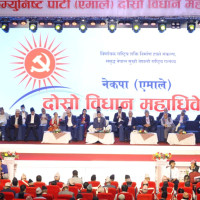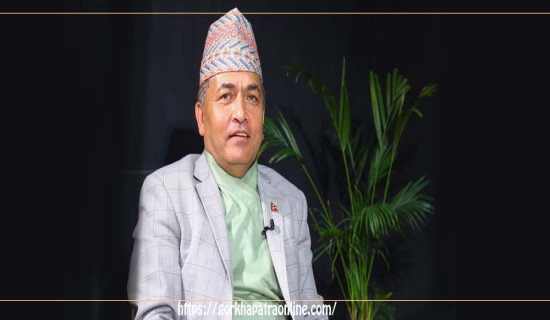- Sunday, 7 September 2025
SCO Crafting Multipolar World Order
True to its motto, 'Advancing the Shanghai Spirit: SCO on the Move,' the 25th summit of the Shanghai Cooperation Organisation (SCO), held in the Chinese port city of Tianjin, was historic. Participated in by the largest number of heads of state or government, it took place at a time when the Western-led global order is cracking under its contradictions. The SCO sought to fill the vacuum created by the US's unilateral yet coercive tariff policy and the Ukraine war that has brought Europe’s economy to its knees. As a powerful voice of the Global South, the SCO has highlighted the centrality of Eurasia in building the multipolar international system. The increasing number of observer states and enhanced dialogue partnerships demonstrate the SCO’s rising appeal for other nations at a time of global disruptions.
The summit witnessed an eye-catching troika involving three powerful leaders - Chinese President Xi Jinping, Russian President Vladimir Putin and Indian Prime Minister Narendra Modi. Holding each other's hands, Putin and Modi walked towards Xi, as the three huddled, shared a good laugh and talked briefly before posing for a group photo. This casual optics delivers a powerful message to the world – they stand together to build a new world order. The trio formed a formidable force capable of presenting a collective response to the West that has dominated the global system since the end of World War II. At the moment, all three leaders are at loggerheads with the US over trade, technology and war.
Alternative model
The SCO, a China-initiated largest regional forum, offered an occasion for the trio to advance their separate cause. There, Modi found reliable friends to counter Donald Trump, who cornered him by imposing steep tariffs on India. Putin never felt defensive on platforms like the SCO. His confidence, gait and laughter were all remarkable during the summit. On the back of it, ‘isolated’ Putin vies for building a just, multipolar world order, defying the hegemony of the West. On the other hand, Xi stands to roll out an alternative governance model based on the principle of sovereign equality, fairness and win-win cooperation. Russian philosopher Alexander Dugin notes that Putin, Xi and Modi embody ancient civilizations that now assert their sovereignty within their own value systems.
“Member States confirm their commitment to the formation of a more representative, democratic, fair and multipolar world order based on the generally recognised principles of international law, including those enshrined in the UN Charter,” stated the Tianjin Declaration issued after the summit, formally known as the meeting of Council of Heads of State of SCO. They have adhered to ‘a line that excludes bloc and confrontational approaches to solving problems of international and regional development’. In an apparent reference to the West, the SCO members have opposed the application of ‘double standards’ in human rights and interference in the internal affairs of other States.
Attended by more than 20 non-Western leaders and heads of 10 international organisations, the two-day event endorsed 24 documents, including the SCO Development Strategy until 2035 and the Statement of the Council of Heads of State of the SCO regarding the 80th anniversary of the end of World War II and the formation of the United Nations. It advocates for a new type of international relations in the spirit of mutual respect, justice, equality and mutually beneficial cooperation.
It has called for ‘creating a community of a single destiny for humanity and developing a dialogue on the idea of "One Earth. One Family. One Future." This exhortation sounds idealistic in the world plagued by war, poverty, inequality and vested geopolitical interests of powerful nations. The apex meeting of the SCO has urged the international community to participate in its initiative "On World Unity for a Just Peace, Harmony and Development". It approved four new SCO centres to strengthen regional security, anti-drug cooperation and information security and contain transnational organised crimes. China has proposed the Global Governance Initiative (GGI) to make the multilateral system more just, inclusive and equitable.
In the last two and a half decades, the SCO has increased its size, strength and craze. The now ten-member SCO boasts a combined economic output of nearly $30 trillion. Last year, the average GDP growth of member states surpassed 5 per cent. They are using national currencies for payments and mutual settlements. Now the focus is on cooperation in the field of energy, infrastructure, digital economy, clean industry and technological innovation. The bilateral and multilateral economic initiatives, such as the China-Central Asia Economic Corridor and the Eurasian Economic Union, have received a new vigour.
Inclusive multilateralism
Like BRICS, the SCO has emerged as a viable instrument of inclusive multilateralism. It has accorded priority to dialogue over confrontation and inclusive development over exclusionary ones. Western institutions are blamed for imposing conditionalities on other nations. But the development path, crafted by the SCO, is free from undue dictation and interference. With its growing strength, enhanced credibility and strategic unity among its members, the SCO now acts as a global stabiliser, offering a new architecture of governance model.
Meanwhile, as a dialogue partner, Nepal has, for the first time, made the highest level of representation in the SCO summit. Prime Minister KP Sharma Oli addressed the SCO Plus Summit, calling for a revitalised SCO so that it can tackle the geopolitical, economic and ecological shocks. The summit provided a rare opportunity for him to hold bilateral talks with a host of nations. Moreover, he was able to register Nepal’s strong reservation over India-China deal to use Nepali territory – Lipulek – in far west Nepal for their religious and trade purposes. PM Oli’s stance on the nation’s territorial integrity has been well received back home. This implies the importance of regional forums for Nepal to promote its national interest and secure economic benefits from the more developed countries.
(The author is Deputy Executive Editor of this daily.)



-original-thumb.jpg)








-original-thumb.jpg)



